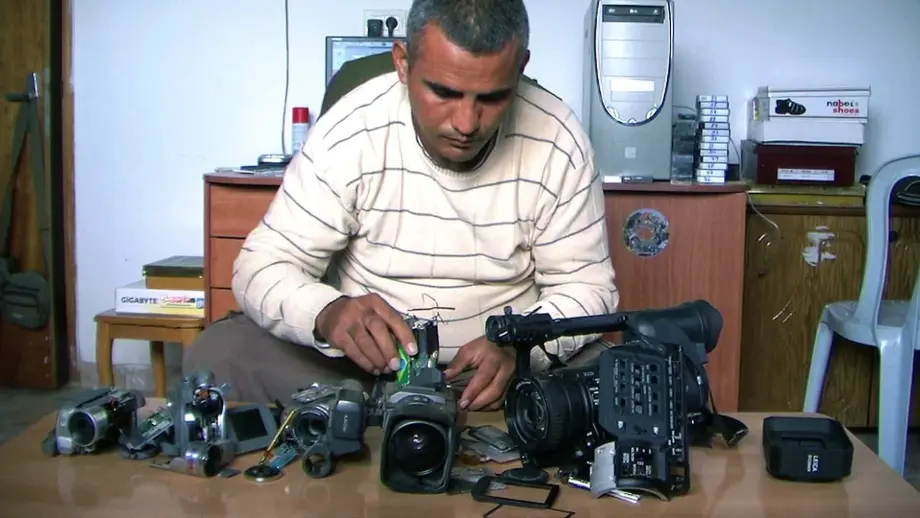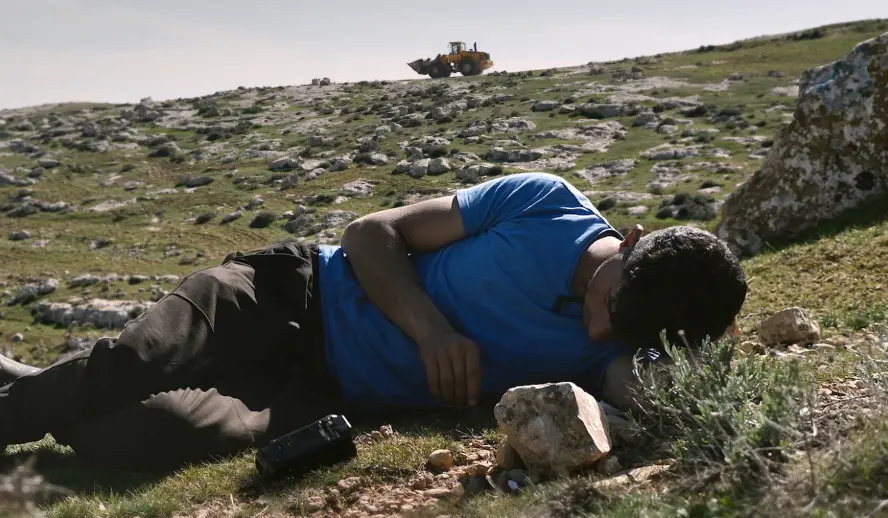
The first time I watched Emad Burnat and Guy Davidi’s 2012 documentary ‘5 Broken Cameras,’ I was struck by its intimacy and undying hope. The film was not just a documentary, it was a life being lived in real time. Through the lens of Burnat’s five cameras, I saw his son, Gibreel, take his first steps as Israeli soldiers demanded his home. I watched as his neighbors resisted with rocks and makeshift posters in hand as bulldozers plowed down their community. I watched Burnat’s cameras, one after another, shatter under the weight of Israeli occupation. Over a decade later, I saw echoes of Burnat and Davidi’s brilliant film ‘No Other Land’; arriving as a continuation of this story, ‘No Other Land’ is eerily generational and congruent in its themes and imagery. The conditions that Burnat documented still thrive. The struggle and the means of resistance remain almost unchanged. If anything, the world’s ability to ignore Palestinian suffering has only grown more sophisticated.
Things to do:
- Subscribe to The Hollywood Insider’s YouTube Channel, by clicking here.
- Limited Time Offer – FREE Subscription to The Hollywood Insider
- Click here to read more on The Hollywood Insider’s vision, values and mission statement here – Media has the responsibility to better our world – The Hollywood Insider fully focuses on substance and meaningful entertainment, against gossip and scandal, by combining entertainment, education, and philanthropy.
‘No Other Land,’ co-directed by Palestinian activist Basel Adra and Israeli journalist Yuval Abraham, is a documentary of quiet devastation and defiant resistance. Much like ‘5 Broken Cameras,’ the film’s point-of-view is deeply personal, closely following Adra and his family as he documents the ongoing and unjust demolitions of the homes, schools, and parts of his community of Masafer Yatta. Both of these films capture the ceaseless march of Israeli military vehicles, the incessant razing of olive groves, the violent arrests, and the cries of children– Gibreel’s first words in ‘5 Broken Cameras’ include “wall” and “war.” The echoes between the two films are undeniable, separated by over a decade but bound together by the same reality: the erasure of Palestinian land, life, and history.
Filmmaking in Palestine
To film in Palestine is an act of resistance. The act of holding a camera is not neutral in Palestinian territory; it is a declaration of presence. In ‘5 Broken Cameras,’ Burnat begins documenting his village of Bil’in with the simple intention of recording his son’s childhood. But as the Israeli military seizes the land of Bil’in, Burnat’s five cameras transform from a personal keepsake to a weapon of witness. Each of his five cameras tells a different chapter of escalating resistance, marked by the destruction of land, homes, and ultimately, of the cameras themselves.
WATCH THE TRAILER of the Film and the Revolution: ‘Can I Go Home Now?’
The Children Around the World Continue to Ask the question
‘No Other Land’ uses the camera as both a shield and a megaphone. Basel Adra, like Burnat before him, records the destruction of his homeland in real time. He films Palestinian families living in caves after the destruction of their homes and children playing amongst the rubble. Israeli soldiers push the elderly to the floor with practiced detachment. The very existence of these images is an act of defiance against a system designed to make them, and the people who capture them, invisible.
Since Burnat’s time, little has changed in Palestine; however, the ability to disseminate these images independently, using social media to market, has improved over the last decade. When ‘5 Broken Cameras’ was released in 2011, its success depended on film festival acceptances and international distribution deals. ‘No Other Land’ managed to secure an Oscar win despite struggling for U.S. distribution, existing in an era where digital sharing and grassroots social media campaigns allow for direct access.
Does this visibility translate to justice? The sheer volume of documentation has not stopped the demolitions. If anything, these films have revealed the world’s willingness to watch and do nothing.
Related article: – Want GUARANTEED SUCCESS? Remove these ten words from your vocabulary| Transform your life INSTANTLY
Related article: ‘Open Wide’ Documentary: A Deep Dive into the World of Mewing and Orthotropics by John & Mike Mew – Hollywood Insider
The Unchanging Reality
Watching ‘5 Broken Cameras’ and ‘No Other Land’ side by side shows that almost nothing about the material conditions of Palestine has changed. In ‘5 Broken Cameras,’ the images of walls being erected, olive trees being burned, and families being displaced are seared in my memory. I saw similar images in ‘No Other Land,’ those same bulldozers razing the land of Masafer Yatta. Gibreel, once a toddler learning the word “cartridge,” could be Adra, growing up and becoming radicalized by watching his home continue to disappear.
Both films are permeated with moments of profound visual symbols. The bulldozer, an omnipresent mechanical force in the natural countryside of Palestine, is a grim reaper, flattening livelihoods with cold efficiency. The olive tree, uprooted time and time again, continues to find places to grow, representing not just Palestinian heritage but resilience. The caves, where displaced families make their shelter, recall decades of history of forced exile and resilient survival. There is a historical weight to these images as if the land itself holds the memory of every injustice. The walls, Burnat’s village cordoned off, recall images of the “peace lines” of Northern Ireland or the Berlin Wall. Walls remain a defining feature of Palestinian life, not only as physical barriers but as bureaucratic ones. Different license plates, legal systems, and rules of existence divide Palestinians and Israelis.
Related article: EVOLUTION: Every Ryan Gosling Role From 1995 to 2020, All Performances Exceptionally Poignant
Related article: EVOLUTION: Every Henry Cavill Role From 2001 to 2021, All Performances Exceptionally Poignant
Related article: ‘Love, Life & Everything in Between’: Oscar-Nominated Arab Filmmakers Dive Into the Love and Relationships in the Middle East – Hollywood Insider
Hope in the Face of Systemic Destruction
Despite the overwhelming dread of injustice in both films, they are not without hope. It is the moments of joy and brotherhood in ‘No Other Land’ that slip through the cracks of devastation that humanize and ground this immense fight for justice in pure humanity. Children play games in the streets, throw snowballs in the winter, and swing gleefully in their soon-to-be-destroyed playground. In ‘5 Broken Cameras,’ Burnar documents these moments of laughter, resilience, and familial bonds that persist even under occupation. It is a reminder that resistance is not just about fighting, it is about continuing to live.
Yuval Abraham, the Israeli journalist standing beside Basel Adra in ‘No Other Land,’ offers a different kind of hope. Abraham acknowledges the system of his own government that privileges him over his friend. In his Oscar speech, he addressed this directly, stating “When I look at Basel, I see my brother, but we are unequal. We live in a regime where I am free under civilian law and Adra is under military laws that destroy his life,” These words are a rare but necessary acknowledgment of Israeli and American complicity in the occupation and a call for political and humanitarian solutions for ethnic supremacy.
Related article: Understanding the Star Wars Timeline
Related article: A Tribute to Francis Ford Coppola: One of Cinema’s Unforgettable Directors | ‘Megalopolis’, ‘The Godfather’ & More
Related article: #metoo Revolution: Powerful Questions That Need Answers
Related article: FACT-CHECKED Series: Timothee Chalamet and 32 Facts about The Young Superstar
Related article: The Oscars: A Look at 2025’s Biggest Night and a Love Letter to Hollywood
Both films raise several questions. What does hope mean when faced with unrelenting oppression? Is it enough to document, to bear witness? Burnat, Davidi, Adra, and Abraham all seem to grapple with this question through their work. The answer, perhaps, lies simply in persistence. If the destruction has not stopped, then the recording does not stop. Even when the world refuses to act, the films ensure that it cannot feign ignorance.
Seeing ‘No Other Land’ in one of the few theatres across the country where it was made available to me, I was struck by its intense similarity to ‘5 Broken Cameras’ not only in form but in content. A decade has passed, yet the story of Palestinians in occupied territory remains painfully the same. These films are not just records of history preserved, they are urgent warnings. They demand attention, not just as documentaries but as acts of resistance. What do we do with these feelings? We cannot simply absorb the images, we must let them shake us into action. In the final moments of ‘No Other Land,’ as Adra and his community rebuild their homes under the cover of night, it is clear that even if the world turns away, the fight continues.
By Leeann Remiker
Click here to read The Hollywood Insider’s CEO Pritan Ambroase’s love letter to Cinema, TV and Media. An excerpt from the love letter: The Hollywood Insider’s CEO/editor-in-chief Pritan Ambroase affirms, “We have the space and time for all your stories, no matter who/what/where you are. Media/Cinema/TV have a responsibility to better the world and The Hollywood Insider will continue to do so. Talent, diversity and authenticity matter in Cinema/TV, media and storytelling. In fact, I reckon that we should announce “talent-diversity-authenticity-storytelling-Cinema-Oscars-Academy-Awards” as synonyms of each other. We show respect to talent and stories regardless of their skin color, race, gender, sexuality, religion, nationality, etc., thus allowing authenticity into this system just by something as simple as accepting and showing respect to the human species’ factual diversity. We become greater just by respecting and appreciating talent in all its shapes, sizes, and forms. Award winners, which includes nominees, must be chosen on the greatness of their talent ALONE.
I am sure I am speaking for a multitude of Cinema lovers all over the world when I speak of the following sentiments that this medium of art has blessed me with. Cinema taught me about our world, at times in English and at times through the beautiful one-inch bar of subtitles. I learned from the stories in the global movies that we are all alike across all borders. Remember that one of the best symbols of many great civilizations and their prosperity has been the art they have left behind. This art can be in the form of paintings, sculptures, architecture, writings, inventions, etc. For our modern society, Cinema happens to be one of them. Cinema is more than just a form of entertainment, it is an integral part of society. I love the world uniting, be it for Cinema, TV, media, art, fashion, sport, etc. Please keep this going full speed.”
More Interesting Stories From The Hollywood Insider
– Want GUARANTEED SUCCESS? Remove these ten words from your vocabulary| Transform your life INSTANTLY
– A Tribute to Martin Scorsese: A Complete Analysis of the Life and Career of the Man Who Lives and Breathes Cinema
– Do you know the hidden messages in ‘Call Me By Your Name’? Find out behind the scenes facts in the full commentary and In-depth analysis of the cinematic masterpiece
– A Tribute To The Academy Awards: All Best Actor/Actress Speeches From The Beginning Of Oscars 1929-2019 | From Rami Malek, Leonardo DiCaprio To Denzel Washington, Halle Berry & Beyond | From Olivia Colman, Meryl Streep To Bette Davis & Beyond
– In the 32nd Year Of His Career, Keanu Reeves’ Face Continues To Reign After Launching Movies Earning Over $4.3 Billion In Total – “John Wick”, “Toy Story 4”, “Matrix”, And Many More
_____________________________________________________________________________









